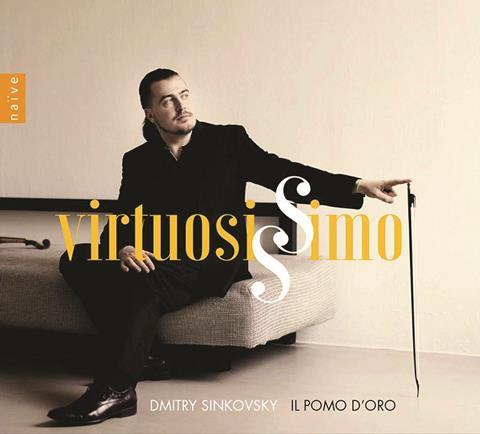Russian artist meets Italian Baroque and the result has thrilling moments

The Strad Issue: February 2020
Description: Russian artist meets Italian Baroque and the result has thrilling moments
Musicians: Il Pomo d’Oro/Dmitry Sinkovsky (violin)
Works: Locatelli: Violin Concerto in D major op.3 no.1. Pisendel: Violin Concerto in G minor (junp I.1). Leclair: Violin Concerto in D major op.7 no.2. Tartini: Violin Concerto in A minor ‘a lunardo venier’ (D115). Telemann: Violin Concerto in B flat major (TWV 51:B1)
Catalogue Number: NAÏVE OP 30576
The booklet description of Dmitry Sinkovsky as a ‘rare meeting of Russian virtuosity and Italian cantabilità with profound philological competence, flavoured by energy and romanticism’, fittingly summarises these performances. The descriptor ‘profound’, though, is questionable, as there is much that is extravagantly theatrical and well beyond the bounds of historical veracity. Dynamic extremes, muscular, quasi-percussive attack, fiercely accented articulations and abundant vibrato are the order of the day and the sound of Sinkovsky’s 1675 Francesco Rugeri, in ‘period’ set-up and closely recorded, has been engineered to approximate that of an electric violin!
There is no doubting Sinkovsky’s virtuosity throughout his concertante tour of Europe, however, whether measured by his precision in the stratospheres of the outer movements of Locatelli’s op.3 no.1, his exhilarating, athletic delivery of their capriccios, or his stunning bowing facility in the demanding solo passagework in the fast movements of these concertos. He also floats a beautifully lyrical cantabile, especially in the slow movements, and adds imaginative extempore ornamentation without loss of melodic flow.
Other nods in the right direction towards bona fide historical performance are the colourful palette of continuo instrumentarium employed and the sheer energy, albeit overblown here, with which movements such as the action-packed finales of these concertos are driven.
ROBIN STOWELL










































No comments yet